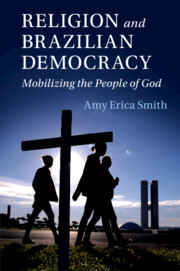Book contents
- Religion and Brazilian Democracy
- Cambridge Studies in Social Theory, Religion, and Politics
- Religion and Brazilian Democracy
- Copyright page
- Dedication
- Contents
- Figures
- Tables
- Acknowledgments
- Part I Introduction
- 1 Introduction
- 2 Clergy, Congregants, and Religious Politicians
- 3 Methods and Case Studies
- Part II What Clergy Think, Say, and Do
- Part III How Congregants Respond
- Part IV Representation
- Afterword
- Book part
- References
- Index
- Books in the Series (continued from p. ii)
1 - Introduction
from Part I - Introduction
Published online by Cambridge University Press: 15 March 2019
- Religion and Brazilian Democracy
- Cambridge Studies in Social Theory, Religion, and Politics
- Religion and Brazilian Democracy
- Copyright page
- Dedication
- Contents
- Figures
- Tables
- Acknowledgments
- Part I Introduction
- 1 Introduction
- 2 Clergy, Congregants, and Religious Politicians
- 3 Methods and Case Studies
- Part II What Clergy Think, Say, and Do
- Part III How Congregants Respond
- Part IV Representation
- Afterword
- Book part
- References
- Index
- Books in the Series (continued from p. ii)
Summary
- Type
- Chapter
- Information
- Religion and Brazilian DemocracyMobilizing the People of God, pp. 3 - 25Publisher: Cambridge University PressPrint publication year: 2019

